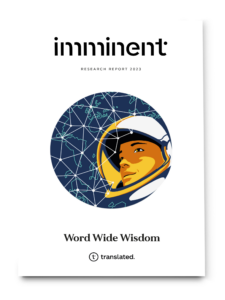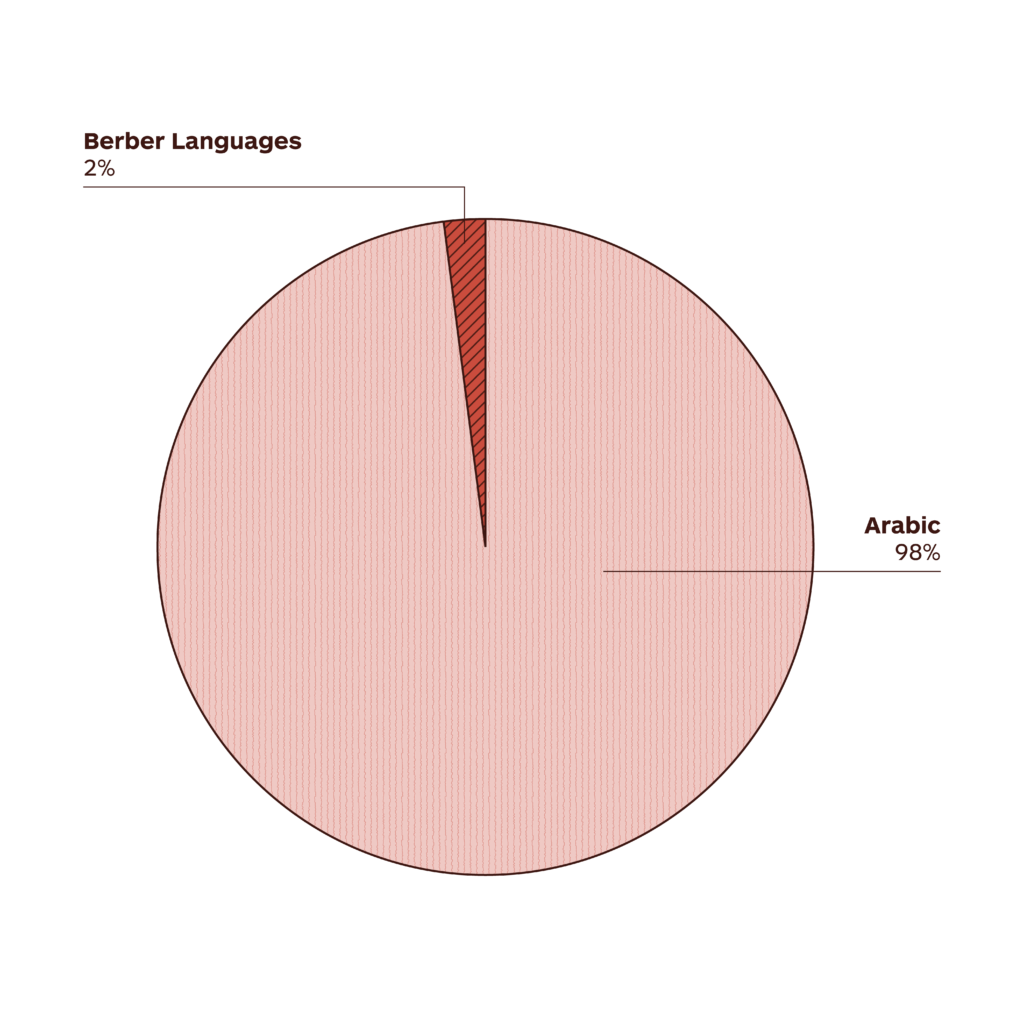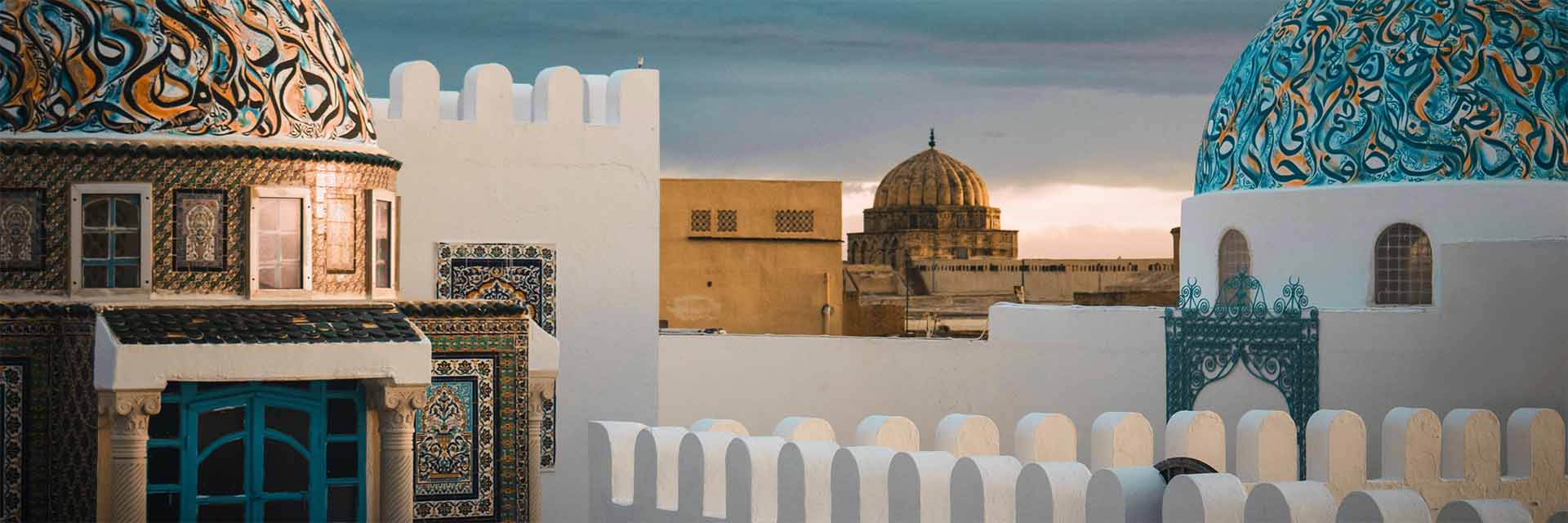Africa
To which language should you translate to localize in Tunisia?
LANGUAGE INSIGHT
Official language
Arabic (68%)
Actual languages
Arabic (68%), French (16%), English (1.2%), other (14.8%)
What the top 150 best localized websites in the world do in Tunisia
(Top 150 websites listed in the Global by Design ranking – published annually by Byte Level Research, this report provides a list of globally localized websites, showcasing best practices and emerging trends in their globalization)
- 28/150 localize by translating into French
- 10/150 localize by translating into both French and Arabic
- 6/150 localize by translating into Arabic
- 1/150 localizes by translating into both French and Portuguese
-
3M
-
ABB
-
Accenture
-
Adidas
-
Adobe
-
Airbnb
-
Aldi
-
Amazon
-
American Airlines
-
American Express
-
Apple
-
Audi
-
Autodesk
-
Avis
-
Bayer
-
BMW
-
Booking.com
-
Bosch
-
British Airways
-
Bumble
-
Burberry
-
BYD
-
Canon
-
Capgemini
-
Cartier
-
Caterpillar
-
Chevrolet
-
Cisco Systems
-
Citibank
-
Coca-Cola
-
Costco
-
Dell
-
Deloitte
-
Delta
-
DHL
-
Disney+
-
Dyson
-
eBay
-
Eli Lilly
-
Emirates
-
Ernst & Young
-
Facebook
-
FedEx
-
Ford
-
Four Seasons
-
Fujifilm
-
GE
-
Gillette
-
GoDaddy
-
Google
-
Gucci
-
Haier
-
Heineken
-
Hermès
-
Hertz
-
Hilton
-
Hisense
-
Hitachi
-
Honda
-
Hotels.com
-
HP
-
HP Enterprise
-
HSBC
-
Huawei
-
Hyatt
-
Hyundai
-
IBM
-
IKEA
-
Intel
-
InterContinental Hotels
-
J&J
-
Jack Daniel's
-
Jehovah’s Witnesses
-
John Deere
-
Kellogg's
-
Kia
-
KPMG
-
L'Oréal
-
Land Rover
-
LEGO
-
Lenovo
-
Lexus
-
LG
-
Louis Vuitton
-
Lululemon
-
LUSH
-
Marriott
-
MasterCard
-
McDonald's
-
Mercedes-Benz
-
Merck
-
Microsoft
-
Mitsubishi Electric
-
Nestlé
-
Netflix
-
Nike
-
Nikon
-
Nintendo
-
Nio
-
Nissan
-
NIVEA
-
Oracle
-
Pampers
-
Panasonic
-
PayPal
-
Pepsi
-
Pfizer
-
Philips
-
Pitney Bowes
-
Porsche
-
Procter & Gamble
-
PWC
-
Revolut
-
Rolex
-
Royal Caribbean
-
Salesforce
-
Samsung
-
Sanofi
-
SAP
-
Sephora
-
Shopify
-
Siemens
-
Sony
-
Spotify
-
Starbucks
-
Steelcase
-
Stripe
-
Subaru
-
Tesla
-
The Church of Jesus Christ of Latter-day Saints
-
Tiffany
-
Tinder
-
Toshiba
-
Toyota
-
TripAdvisor
-
Uber
-
United Airlines
-
UPS
-
Visa
-
Volkswagen
-
Volvo Cars
-
Vrbo
-
Walmart
-
Western Union
-
Wikipedia
-
Wise
-
WordPress
-
Workday
-
Xerox
-
Xiaomi (Mi)
-
Zara
-
Zoom
If you need others information, below you can find a selection of economic/social/cultural data
Language
Official language
Arabic (68%)
Other languages
French (16%), English (1.2%), other (14.8%)
T-index
0.059%
T-Index ranks countries according to their potential for online sales.
English
Moderate proficiency (EF) – 56 of 111 countries/regions in the world- 6/20 position in Africa.
Demography
Capital: Tunis
Currency: Tunisian Dinar
Population: 12,26 m
Population density: 78/km2
Economy
GDP: 46.69 billion USD (2021)
GDP per capita: 3,807.1 USD (2021)
Exports: $18.8 billion (2020)
Statistics
Internet users: 79% penetration, 9.80 million
Unemployment rate: 16.3% (2021)
Urbanisation: 68.95%% (2020)
Literacy: 83% (2021)
Conventions
Numbering system
Arabic numerals and comma as decimal separator
Date format: dd – mm – yyyy
Time: 24h time system
Country code: 00216
Language data sources: Worldatlas/Britannica//EF/Wikipedia; Demography data sources: IMF/Worldometers; Conventions data source: Wikipedia; Economy data sources: WTO/OEC/CIA/Esomar/Datareportal; Statistics data sources: Datareportal/WorldBank/UN/UNESCO/CEIC/IMF/Culturalatlas/
Facts and data
Economy
Imports
$18.8 billion (2020). Refined Petroleum ($1.94B), Petroleum Gas ($941M), Cars ($655M), Low-voltage Protection Equipment ($542M), and Wheat ($529M), importing mostly from France ($3.5B), Italy ($3.11B), China ($2.2B), Germany ($1.64B), and Turkey ($1.41B).
Financial inclusion factors (over 15 years of age)
• 37% have an account with a financial institution
• 7.1% have a credit card
• 2% have a mobile money account
• 6.6% make online purchases
Ease of doing business
Ease of conducting business is medium (rated 68.7 out of 100). Ranked 8th out of 32 North African and Middle Eastern countries. Ranked 78th out of 190 countries worldwide (2022, World Bank).
Exports
$23.5 billion (2020). Insulated Wire ($2.63B), Crude Petroleum ($754M), Non-Knit Men’s Suits ($735M), Pure Olive Oil ($690M), and Low-voltage Protection Equipment ($532M), exporting mostly to France ($4.66B), Italy ($3.24B), Germany ($2.59B), Spain ($744M), and Libya ($646M).
Main local online stores
tayara.tn, jumia.com.tn and tunisie-annonce.com
Economic freedom
‘Mostly not free’ (rated 52.9 out of 100). Ranked 10th out of 14 North African and Middle Eastern countries. Ranked 132nd out of 186 countries worldwide (2023, Heritage Foundation and Wall Street Journal).
Global Innovation Index
Ranked 10th out of 18 North African and Western Asian countries, and 73rd out of 132 worldwide.
The Global Innovation Index captures the innovation
ecosystem performance of 132 economies and tracks the most recent global innovation trends.
Economy data sources: WTO/OEC/CIA/Esomar/Datareportal
Service Imports (2020)
Source: OEC
Service Exports (2020)
Source: OEC
Most specialised products by RCA Index (2020)
Specialisation is measured using Revealed Comparative Advantage, an index that takes the ratio between Tunisia observed and expected exports in each product
Source: OEC
Most complex products by PCI Index
Product Complexity Index measures the knowledge intensity of a product by considering the knowledge intensity of its exporters
Source: OEC
Export Opportunities by Relatedness
Relatedness measures the distance between a country's current exports and each product, the barchart show only products that Tunisia is not specialized in
Source: OEC

Research Report 2023
• Make confident decisions using our benchmarks and statistics.
• Break down barriers and reach 100+ countries.
• Gain the AI insights, advice and tools to achieve your mission-critical priorities.
• Discover how the neurobiological perspective of language can open new ways of understanding.
• Build a bridge between research and corporate worlds.
Get your copy now
Media
Media language Arabic, French
Information channels
Television is the dominant medium. Satellite networks and pan-Arab channels are widely watched.
Many privately-run outlets have direct or indirect political links, although this is prohibited by the broadcasting regulator. Privately-owned TV and radio stations have larger audiences than state media.
Tunisia ranks highly among Arab countries for media freedom, but there are concerns about the use of repressive laws from the time of the former regime.
The online landscape is open and lively, but users tend to self-censor when discussing sensitive topics.
The press
La Presse – state-owned daily
Esshafa – state-owned daily
Assabah – private daily
Alchourouk – private daily
Le Temps – private daily
Le Maghreb – private daily
Akhbar Al Joumhouria – weekly covering political, economic, cultural and sports news
Television
Al-Watania (National TV) – state-run
Hannibal TV – first private TV
Nessma TV – private
El Hiwar Ettounsi TV – private
Radio
Tunisian Radio – state-run; four national and five regional stations
Shems FM – state-owned
Mosaique FM – first private radio
Jawhara FM – private
Express FM – Arabic-language station specialising in economic and financial news
News agency
Agence Tunis Afrique Presse – state-run, English-language pages
Kapitalis – news website
Tunisie Numerique – news website
Media data source: BBC
Internet Data
Internet users
79% penetration, 9.80 million
Share of web traffic by device
58.46% mobile phones, 40.73% computers (laptops and desktops), 0.79% tablet devices and 0.02% other devices
Median speed of mobile Internet connection
21.42 Mbps
Median speed of fixed Internet connection
8.15 Mbps
Mobile connection as a percentage of total population: 132.9%
Percentage of mobile connections that are broadband (3G-5G): 61.16%
Most popular web search engines
Google (96.18%), Bing (2.26%), Yahoo (0.77%), Petal Search (0.59%), Yandex (0.07%), DuckDuckgo (0.06%),
Most used social media
Facebook (86.92%), YouTube (5.94%), Instagram (3.77%), Twitter (2.27%), Pinterest (0.55%), Linkedin (0.42%)
Internet data sources: Datareportal/Statcounter
Social statistics
Life expectancy
75 yrs (2020)
Average age of the population
15.1%
Healthcare expenditure
6.96% of GDP
Gender
The principle of gender equality in terms of citizenship and legal guarantees is declared in the Tunisian constitutional and legislation. Women participate in political and social life and they have the same professional opportunities as men.
Ethnicity
In Tunisia, tolerance is taken for granted, irrespective of ethnic origin, and it is normal for people of different ethnicities to live together.
Religion
Religion is very important in society. People are tolerant and expect that foreigners will respect their religion (Islam). Foreigners are free to practice their religions. A certain percentage of the Tunisian population does not practice any religion.
Ethnicity
In Tunisia, tolerance is taken for granted, irrespective of ethnic origin, and it is normal for people of different ethnicities to live together.
Class
The majority (75%) of the population belongs to the middle class. Recently, the emergence of a wealthy class and an increase in poverty has been noticed. The family is a strong central structure hold in a society like Tunisia’s that is based on assistance and solidarity.
Tertiary education in Tunisia
Tertiary education in Tunisia by sex
The Data Factbook is a work in progress project. Our community is helping us to fill it up always with new and updated data. Your contribution is precious. If you want to help us, please write your advices at imminent@translated.com
Languages research
Languages spoken in Tunisia

The geographical distribution of languages that you will find in the maps published in this section is a work in progress. Our community is helping us to fill it up with always new and updated data. Your contribution is precious. If you want to help us, please write to imminent.factbook@translated.com
Photo credit: Haythem Gataa, Unsplash


